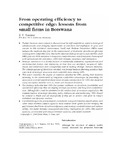From operating efficiency to competitive edge: lessons from small firms in Botswana

View/
Date
2008Author
Temtime, Z.T.
Publisher
WileyInterscience, http://www.wileyinterscience.comType
Published ArticleMetadata
Show full item recordAbstract
Today’s business environment is characterized by stiff competition, rapid technological
advancements, and changing requirements of customers and employees. To grow and survive in this turbulent environment, Small and Medium Enterprises (SMEs) must balance the emphasis they put on the improvement of short-term operational efficiency and long-term competitiveness. Due to the apparent lack of resources and expertise, most
SMEs pay very little attention to long-term competitiveness and dynamism. Preoccupied
with operational bits and pieces, SMEs lack strategic awareness and orientation.
Strategic awareness is a mental process of continually evaluating organizational and
environmental factors and improving on how they are identified, recognized, influenced, and interpreted, and consequently used in making strategic business decisions. The widespread use of short-term oriented, non-formal business planning practices indicates lack of strategic awareness and competitiveness among SMEs. This paper examines the degree of emphasis attached by SMEs, during their business planning, to the achievement of long-term competitive advantages by presenting evidence
from a recent empirical study based on data collected from 91 SMEs and analyzed
using descriptive statistics such as mean and standard deviation. The findings indicated that SMEs put greater emphasis on short-term profitability and
operational efficiency than developing strategic awareness and long-term competitiveness.
Although this could be attributed to the relative lack of resources required for the
implementation of strategic planning, policy deployment, and positioning, SMEs should be assisted to think and act strategically if they are to survive and grow in today’s
turbulent and dynamic markets.
Government agencies, policy-makers, consultants, non-governmental organizations, and
other small business support agencies must redirect their efforts toward bridging the gap between short-term operational efficiency and strategic competitiveness and sustainability.
This paper provides managerial and policy implications for SMEs, SME support
agencies, government and non-government agencies, and future research.
